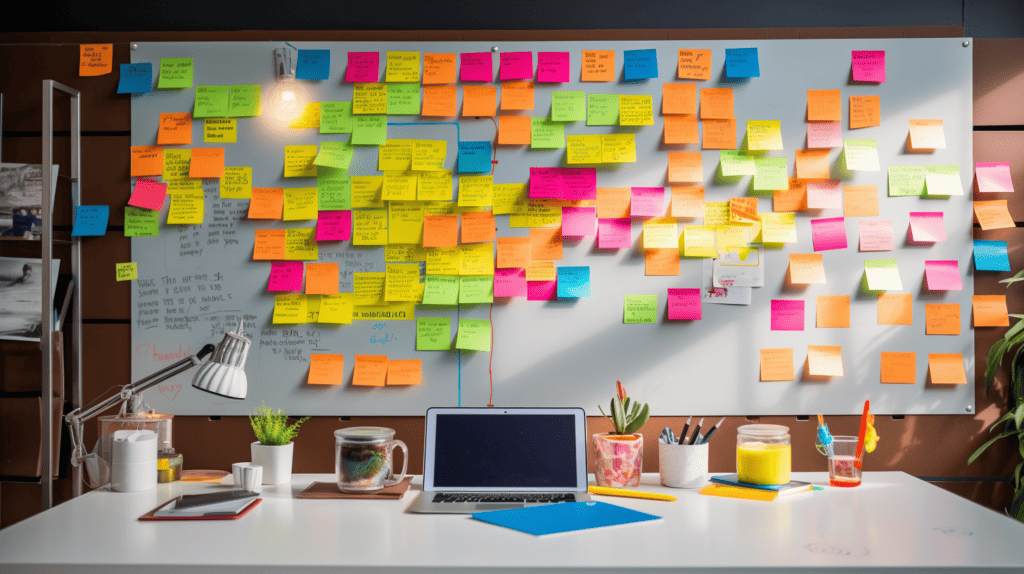Stress is an inevitable part of life, but it can have a significant impact on our ability to stay productive, both at work and in our personal lives. When we’re stressed, we may find it challenging to focus, make decisions, and complete tasks efficiently. Fortunately, there are effective stress management techniques that can help us reduce stress and boost productivity.
In this article, I’ll provide an overview of stress management and its impact on productivity. I’ll also share practical tips and strategies for identifying your stress triggers, practicing self-care and stress reduction, creating a stress-reducing work environment, managing time effectively, seeking support, adopting healthy habits and lifestyle choices, and embracing mindfulness and relaxation techniques. By implementing these stress management techniques, you can better manage your stress and unlock your full potential.
Key Takeaways
- Stress can have a significant impact on our productivity.
- Effective stress management techniques can help reduce stress and boost productivity.
- In this article, we’ll explore tips and strategies for managing stress effectively.
Understanding Stress and Its Effects on Productivity
As a copywriter journalist, I understand the importance of productivity. However, stress can often hinder our ability to stay focused and perform at our best. That’s why understanding stress and its impact on productivity is crucial for anyone looking to achieve their goals.
Stress is a natural response to perceived threats or challenges. It can be caused by a variety of factors, including work-related pressures, financial difficulties, personal relationships, and health issues. When we experience stress, our bodies release hormones that trigger the “fight or flight” response, preparing us to respond to the perceived threat.
While stress can be beneficial in small doses, chronic stress can have detrimental effects on our mental and physical well-being. It can lead to anxiety, depression, and burnout, among other health issues. Moreover, it can significantly impact our productivity by reducing our ability to concentrate and make decisions.
Understanding Stress Management Skills
That’s why stress management skills are essential for anyone looking to stay productive and achieve their goals. By practicing effective stress management techniques, we can reduce our stress levels and improve our overall well-being.
Effective stress management strategies vary from person to person and depend on individual circumstances. Some commonly recommended techniques include practicing mindfulness, engaging in physical activity, establishing healthy routines, seeking support from others, and adopting healthy habits and lifestyle choices.
By understanding stress and its effects on productivity and developing effective stress management skills, we can unlock our full potential and achieve our goals with greater ease and efficiency.

Identifying Your Stress Triggers
As I mentioned earlier, identifying your unique stress triggers is an essential step towards effective stress management. Stress triggers are those situations, people, or circumstances that make you feel stressed and overwhelmed. They are different for everyone, and understanding them is crucial in developing an individualized stress management plan.
To start identifying your stress triggers, take some time to reflect on your past stressful experiences. Think about what was happening, who was involved, and how you felt. Once you have a clear idea of your stress triggers, you can take proactive steps to manage them effectively.
Some common examples of stress triggers include:
- Work-related stressors such as deadlines, workload, or challenging colleagues
- Personal issues such as financial problems, relationship conflicts, or health concerns
- Environmental factors such as noise, air pollution, or an uncomfortable working space
Once you have identified your stress triggers, you can take steps to avoid, minimize, or cope with them. For example, if you find that traffic on your way to work is a significant stressor, you can try leaving earlier to avoid rush hour or using public transportation instead. If you have a challenging coworker, you can try communicating more effectively with them, or if necessary, discuss the issue with your manager or HR representative.
Remember, stress triggers are different for everyone, and what works for one person may not be effective for another. Take the time to explore different strategies and techniques until you find what works best for you.
Practicing Self-Care and Stress Reduction
Managing stress can feel overwhelming, but one of the easiest and most effective ways to do it is by taking care of yourself. Practicing self-care can help you reduce stress and increase your productivity. Here are some tips:
Establish a Routine
Creating a consistent routine can help you feel more in control of your day. Start by waking up and going to sleep at the same time each day, even on weekends. Incorporate other healthy habits, such as exercise, meal planning, and time for relaxation, into your routine to help manage stress.
Get Moving
Exercise is one of the best stress-reduction techniques. Even a quick walk around the block can help you clear your mind and reduce stress levels. Find a form of physical activity that you enjoy, whether it’s yoga, dancing, or running, and make it a regular part of your routine.
Practice Mindfulness
Mindfulness is the practice of being present in the moment, without judgment. It can help you manage stress and improve your overall well-being. Try incorporating mindfulness into your day by taking deep breaths, meditating, or practicing yoga.
Make Time for Relaxation
Relaxation is an important aspect of self-care. Schedule time for activities that you find soothing, such as reading, taking a bath, or listening to music. Remember, taking a break from your work can actually help you be more productive in the long run.
Get Some Rest
Adequate sleep is essential for managing stress and staying productive. Aim for 7-9 hours of sleep each night, and establish a consistent bedtime routine to help you wind down before sleep. Avoid electronics and caffeine before bed, and create a calm environment in your bedroom.

Creating a Stress-Reducing Work Environment
Creating a work environment that is conducive to reducing stress and promoting productivity is essential. Here are some tips and techniques for achieving a stress-free work environment:
Organize Your Workspace
A cluttered workspace can lead to increased stress and decreased productivity. Take the time to declutter your workspace and organize it in a way that makes sense to you. Keep essential items within reach and store non-essential items out of sight. Designate a place for everything to avoid wasting time searching for items.
Set Boundaries
Setting boundaries is an important aspect of reducing stress at work. Establish clear work hours and communicate them to your colleagues. Avoid taking work home with you and resist the temptation to check your work email outside of business hours. Maintaining a healthy work-life balance is essential for managing stress levels and staying productive.
Use Effective Time Management Techniques
Effective time management is key to reducing stress levels and increasing productivity. Prioritize tasks based on their importance and deadlines. Break down big projects into smaller, manageable tasks to avoid feeling overwhelmed. Use a planner or app to help you stay organized and on track.
Take Breaks
Taking breaks throughout the workday is essential for reducing stress levels and increasing productivity. Step away from your workspace to take a quick walk or stretch. Practice deep breathing exercises or engage in a mindfulness exercise to help you recharge and re-focus.
Communicate with Colleagues
Building strong relationships with colleagues and communicating openly can help reduce stress levels and promote a positive work environment. Take the time to get to know your colleagues and build a rapport. Reach out for support or guidance when needed, and offer the same to your colleagues when they are in need.
Conclusion
A stress-free work environment is essential for increasing productivity and achieving success. By organizing your workspace, setting boundaries, using effective time management techniques, taking breaks, and communicating with colleagues, you can create a work environment that promotes optimal performance and overall well-being.

Time Management and Prioritization
Managing time efficiently is an essential aspect of stress management and productivity. When we feel overwhelmed with tasks, it is easy to become stressed and disengaged, ultimately impacting our ability to perform well. Therefore, it is crucial to develop effective time management techniques that help us prioritize tasks, set realistic goals, and avoid burnout.
Creating a To-Do List
One of the most effective ways to manage time is by creating a to-do list. An organized list provides a clear overview of the tasks that need to be completed, allowing us to plan our day and prioritize tasks according to their importance and urgency. This prioritization helps in avoiding procrastination and overwhelm, ultimately reducing stress. Besides, crossing off completed tasks gives us a sense of accomplishment and motivation to continue with remaining tasks.
Setting Realistic Goals
Setting realistic goals is another crucial aspect of time management. When we set unrealistic goals, we end up taking on more than we can handle, leading to burnout and stress. Therefore, it is essential to evaluate our capabilities and set achievable goals that align with our schedules, skills, and resources. Breaking down larger goals into smaller milestones also helps reduce stress and enables us to monitor progress effectively.
Avoiding Multitasking
Although multitasking may seem like a practical way to manage time, it can actually have the opposite effect. Juggling multiple tasks at once can lead to decreased productivity and increased stress levels. Instead, focus on completing one task at a time and move on to the next one. This approach not only reduces stress but also allows us to complete tasks more efficiently and effectively.
Taking Breaks
Taking breaks is a critical component of time management and stress reduction. Pushing ourselves to work continuously without any break leads to burnout, exhaustion, and decreased productivity. Taking short breaks allows us to recharge, refresh our minds, and come back to work with renewed energy and focus. It is advisable to plan breaks between tasks and adhere to them strictly to avoid overworking and stress.
Using Technology
Advancements in technology have made it easier to manage time and stay organized. There are several apps and software available that can help us streamline our to-do lists, set reminders, and manage our schedules. These tools can come in handy when managing multiple tasks and deadlines, ensuring that we don’t miss out on important appointments or tasks.
In conclusion, effective time management is a crucial aspect of stress management and productivity. By creating a to-do list, setting realistic goals, avoiding multitasking, taking breaks, and using technology, we can efficiently manage our time, reduce stress levels, and enhance our productivity levels. These techniques require practice and consistency, but with time, they become habits that help us perform at our best.

Seeking Support and Building Relationships
Managing stress can feel overwhelming at times, and it’s important to remember that you don’t have to do it alone. Seeking support from others can be a powerful way to manage stress and boost productivity.
Building strong relationships can provide a sense of comfort and security, helping to reduce stress levels. Whether it’s seeking guidance or mentorship from a colleague, or simply venting to a supportive friend, reaching out to others can make a big difference.
Another way to manage stress is by leveraging social support networks. Connecting with like-minded individuals through professional organizations or social media groups can provide a sense of community and belonging that can help alleviate stress.
How to Build Strong Relationships:
- Make time for social activities: Building relationships takes effort, and making time for social activities is a great way to connect with others. Whether it’s attending networking events or joining a recreational sports league, finding ways to connect with others can help reduce stress and enhance productivity.
- Offer support to others: Helping others can be a great way to reduce stress and build meaningful relationships. Whether it’s offering guidance or simply lending an ear, being there for others can foster a sense of connection and purpose.
- Be open and honest: Authenticity and vulnerability can help build trust and deepen relationships. Don’t be afraid to share your struggles and challenges with others – chances are they have experienced similar stressors and can offer valuable support and insight.
“Remember, you don’t have to do it alone. Seeking support from others can be a powerful way to manage stress and boost productivity.”
Why Mentorship is Important:
Having a mentor can be an invaluable resource in managing stress and increasing productivity. Mentors can offer guidance, support, and perspective, helping to navigate workplace challenges and develop new skills.
When seeking a mentor, look for someone who has experience in your field and embodies the qualities and values you admire. Be clear about your goals and expectations, and be open to feedback and constructive criticism.
Remember, mentorship is a two-way street. Don’t be afraid to offer your own perspective and insights, and be willing to give back to others in the future.
The Benefits of Workplace Support:
Creating a supportive work environment can be instrumental in managing stress and increasing productivity. Building positive relationships with coworkers and superiors can foster a sense of teamwork and collaboration, helping to reduce stress and create a more positive work culture.
When building workplace relationships, focus on open communication, respect, and empathy. Don’t be afraid to offer help or support when needed, and be willing to seek out feedback and constructive criticism when appropriate.
By creating a supportive workplace culture, you can not only manage stress more effectively, but also inspire and motivate those around you to do the same.

Adopting Healthy Habits and Lifestyle Choices
One of the most effective ways to manage stress and enhance productivity is by adopting healthy habits and making positive lifestyle choices. Incorporating exercise, balanced nutrition, and adequate rest into your daily routine can help reduce stress levels and promote overall well-being.
Regular physical activity, such as walking, jogging, or practicing yoga, can help release tension and improve mood. It can also boost energy levels and increase focus, making it easier to tackle tasks and stay productive throughout the day. Aiming for a balanced and nutritious diet, including plenty of fruits, vegetables, lean proteins, and whole grains, can also support physical and mental health.
Getting enough rest and practicing good sleep hygiene can also play a critical role in managing stress levels and enhancing productivity. Setting a regular sleep schedule, creating a calming bedtime routine, and avoiding electronic devices before bed can help improve sleep quality and promote relaxation.
Overall, making healthy lifestyle choices can be a powerful tool in managing stress and increasing productivity. By prioritizing physical and mental well-being, you can improve your ability to manage stress and optimize your performance and productivity at work and beyond.
Embracing Mindfulness and Relaxation Techniques
When it comes to managing stress and improving productivity, mindfulness and relaxation techniques can be incredibly powerful. By taking time to quiet the mind and focus on the present moment, we can reduce stress levels and enhance our ability to stay focused and productive.
One effective mindfulness technique is deep breathing. By taking slow, deep breaths and focusing on the sensation of air moving in and out of our bodies, we can slow our heart rate and calm our minds. It can be helpful to set aside a few minutes each day to practice deep breathing, especially during times of high stress.
Another effective relaxation technique is progressive muscle relaxation. This involves tensing and then releasing different muscle groups in the body, starting at the head and working down to the feet. This can help release tension and promote relaxation throughout the body.
Meditation is another powerful mindfulness technique. By focusing on a single point of attention, such as the breath or a specific mantra, we can quiet the mind and reduce stress levels. Even just a few minutes of meditation each day can have a significant impact on our overall well-being.
Finally, it can be helpful to incorporate other relaxation practices into our daily routines. This might include taking a relaxing bath, practicing yoga or stretching, or listening to calming music. By prioritizing our own self-care and taking time to relax and unwind, we can better manage our stress levels and stay productive throughout the day.
Conclusion on How To Better Manage Your Stress To Stay Productive
In conclusion, managing stress is crucial for staying productive and achieving success. Throughout this article, I have shared various tips and techniques to help you better manage stress and improve your productivity.
It is important to understand the effects of stress on your mental and physical well-being and identify your unique stress triggers. Practicing self-care, creating a stress-reducing work environment, and adopting healthy habits and lifestyle choices can all contribute to stress reduction.
Effective time management and prioritization are also essential in managing stress and increasing productivity. Seeking support from others and building strong relationships can provide guidance and help you cope with stress.
Finally, embracing mindfulness and relaxation techniques can help you manage stress levels and stay focused. By implementing these strategies, you can reduce stress and unlock your full potential.
Remember, stress management is an ongoing process, and it takes time and effort to develop effective coping mechanisms. I encourage you to take action and implement these strategies in your daily routine to better manage your stress and achieve your goals.
FAQ on How To Better Manage Your Stress To Stay Productive
Q: How can I better manage my stress to stay productive?
A: Managing stress is essential for maintaining productivity. It can be achieved through various stress management techniques and stress reduction strategies.
Q: What are some stress management skills I can develop?
A: Developing stress management skills involves understanding stress and its effects on productivity. It requires adopting effective stress management strategies.
Q: How can I identify my stress triggers?
A: Identifying your stress triggers involves recognizing signs of stress and understanding the situations or circumstances that tend to cause stress.
Q: What are some self-care practices for stress reduction?
A: Practicing self-care is crucial for managing stress and staying productive. It includes techniques like mindfulness, physical activity, and establishing healthy routines.
Q: How can I create a stress-reducing work environment?
A: Creating a stress-reducing work environment involves organizing your workspace, setting boundaries, and implementing effective time management techniques.
Q: What is the importance of time management in stress management?
A: Effective time management is essential for managing stress and increasing productivity. It involves prioritizing tasks, setting realistic goals, and avoiding burnout.
Q: How can seeking support and building relationships help with stress management?
A: Seeking support from others and building relationships can provide valuable guidance and social support networks to effectively cope with stress.
Q: How do healthy habits and lifestyle choices affect stress management?
A: Incorporating healthy habits such as exercise, balanced nutrition, and adequate rest into daily routines promotes stress reduction and overall well-being.
Q: How can mindfulness and relaxation techniques help in stress management?
A: Mindfulness and relaxation techniques, such as deep breathing exercises, can reduce stress levels and enhance focus for better stress management and productivity.
Q: What is the conclusion of managing stress for productivity?
A: Managing stress is crucial for maintaining productivity. By implementing stress management techniques and strategies discussed throughout this article, you can better manage your stress and unlock your full potential.





Leave a Reply